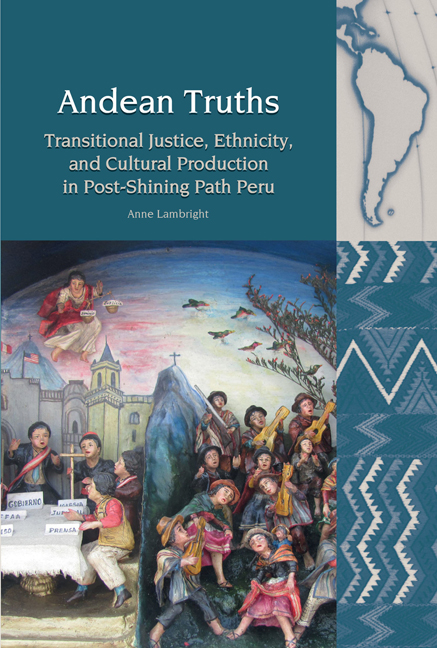Book contents
- Frontmatter
- Contents
- List of Figures
- Acknowledgements
- Introduction
- 1 Sustaining Dominant Narratives
- 2 Transitional Justice and Reconciliation through Identification
- 3 Dead Body Politics
- 4 Towards a Narrative Pachacutic
- 5 Collaborative Truth-Telling
- 6 Reconciling through other Knowledges
- 7 Conclusion
- Works Cited
- Index
2 - Transitional Justice and Reconciliation through Identification
- Frontmatter
- Contents
- List of Figures
- Acknowledgements
- Introduction
- 1 Sustaining Dominant Narratives
- 2 Transitional Justice and Reconciliation through Identification
- 3 Dead Body Politics
- 4 Towards a Narrative Pachacutic
- 5 Collaborative Truth-Telling
- 6 Reconciling through other Knowledges
- 7 Conclusion
- Works Cited
- Index
Summary
Paloma de papel and La teta asustada
Highly successful commercial films, Fabricio Aguilar's Paloma de papel (Paper Dove, 2003) and Claudia Llosa's La teta asustada (Milk of Sorrow, 2009) are two of the few dominant cultural products that directly engage the Andean experience of the war and its aftermath, while exploring issues of worldwide interest: recruitment of child soldiers and violence against women. Paloma de papel and La teta asustada are important works because both bring the Andean experience of the war to the forefront of national cultural dialogue. Unlike the novels studied in the previous chapters, or for that matter other contemporaneous commercial films, they ask the audience to engage difference and to connect emotionally with the indigenous and indigenous-mestizo characters portrayed. However, I would argue that Paloma de papel looks at its subject from a vertical position within the dominant power structure, taking a paternalistic stance much like that of the CVR's Informe final. It aims to bring the audience to a collective catharsis via a vicarious experience of trauma that uses, rather than involves, indigenous subjects. La teta asustada, on the other hand, through both its circumstances of production and its treatment of its subject matter, assumes a more horizontal position with respect to indigenous communities. In considering the question of national culture and the citizen-subject in post-Shining Path Peru, La teta asustada is unique in that re-locates national culture and redefines the national subject, suggesting that the future of Peru lies greatly in urban indigenous culture.
Furthermore, the film demands a new ethical stance on the part of the larger audience, obliging the public to take a position less of a far-away empathizer and more of solidarity.
Commercial films about the Shining Path era have been around since the 1980s; some of the most notable are Francisco Lombardi's La boca del lobo (The Lion's Den, 1988) and La vida es una sola (You Only Live Once, 1993), by Marianne Eyde, both of which are set in rural communities in the highlands. Of those released after 2003, three popular films, Josué Méndez's Días de Santiago (Days of Santiago, 2004), Lombardi's Mariposa negra (Black Butterfly, 2006), and Rosario García-Montero's Las malas intenciones (The Bad Intentions, 2011) are not set in the sierra, and indeed Mariposa negra makes no reference at all to indigenous peoples.
- Type
- Chapter
- Information
- Andean TruthsTransitional Justice, Ethnicity, and Cultural Production in Post-Shining Path Peru, pp. 60 - 87Publisher: Liverpool University PressPrint publication year: 2015



